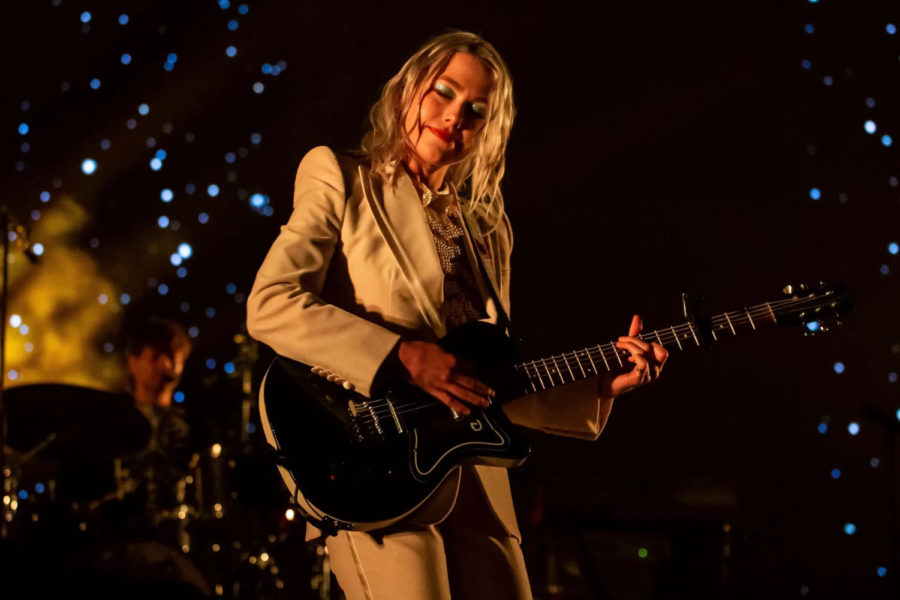“The next song is a bummer,” Phoebe Bridgers warned the crowd before performing her heartbreak anthem “Moon Song.” But all of us in the audience already knew the melancholy that was in store for us. Moving through a set list composed primarily of slow-tempo songs, Phoebe Bridgers allowed us all the experience of the therapeutic power of sad music.
On June 4, Phoebe Bridgers’s Reunion Tour concert at the Huntington Bank Pavilion brought together a sea of Bridgers fans in Dr. Martens and skeleton costumes. Replacing Charlie Hickey as the opener, breakout indie-pop artist and Chicagoland native didn’t disappoint. On their first date joining Bridgers on tour, Claud dazzled their hometown with hits like “Soft Spot,” which has accumulated over nine millions streams on Spotify. Forty minutes later, after Claud’s set, Phoebe Bridgers stormed the stage in a white suit, rocking out her career-defining single “Motion Sickness,” the most popular single out of her debut album Stranger in the Alps.
Among the concertgoers, there was an understanding that we would all cry at some point, since Bridgers’s specialty is bringing together all the lovers of heartbreak and existential angst tunes. Bridgers’s willingness to give in to her emotions, even the most undesirable ones, spread amongst the crowd as we sang along to her signature songs “Funeral” and “Smoke Signals.” Fans’ palpable emotional connections to the material created a surprisingly intimate atmosphere at such a large venue. Being in a space to sing about loneliness in a room full of people who can for sure say they have felt the same way as you is ultimately why you go to a Phoebe Bridgers concert. It is an opportunity to feel closer to the music that pulls at your heartstrings—all in the company of an army of fans whose favorite activity is unpacking their sorrows.
Bridgers’s strengths as an artist shine the most in her candid lyrics and soul-stirring vocals. Thankfully, these attributes are never outshined by the show’s production. Images of a pop-up book turning its pages lit up the large screen behind Bridgers, each page illustrating the themes of the song Bridgers would play next. The drawings’ connection to the material enhanced the performance’s intimate atmosphere, bringing Bridgers’s world closer to the fans who find solace in her art. These visuals gave the stage a glimpse of her lyrical imagination without ever being a distraction.
Although Bridgers shied away from long monologues between songs, her shorter interventions composed some of the night’s most memorable moments. In them, you could tell Bridgers knows who her audience is and the things that matter most to them; Phoebe congratulated all LGBTQIA+ attendees for Pride Month. Before playing “Chinese Satellite,” she spoke about the importance of abortion rights and protections for trans youths. Bridgers shared that she has had audience members walk out of her show when she makes such statements, a surprising anecdote considering her fanbase’s progressive demographic. I laughed a bit, thinking about what my conservative mother’s reaction would have been at that moment. I did borrow money from her for these tickets, which, in my head, was funneling right-wing funds to support queer entertainment.
Even though Phoebe Bridgers has assembled a fan base that wears their anguish as a badge of honor, they were still energized when the time came for her more upbeat songs. We went from sobbing due to the pains of unrequited love in “Moon Song” to relentlessly shouting the words of “ICU.” Right before playing the electrifying Grammy-nominated single “Kyoto,” Bridgers said, “this one is for everybody’s dad,” inviting all of us with parental trauma to sing lyrics like “I want to kill you if you don’t beat me to it” at the top of our lungs. However, the biggest screams of the night came with the track “I Know the End,” a song released during the coronavirus quarantine that finally got to live up to its potential with a live audience. During the song’s explosive ending, fans pushed their vocal cords to the extreme, screaming just as Bridgers does in the recording. Moments of release such as these were the epitome of a Bridgers concert, allowing everybody present to embrace the anger, pain, and joy that Bridgers’s music evokes. Outside my bedroom, I can’t think of a safer space to sob than at a Phoebe Bridgers concert.









